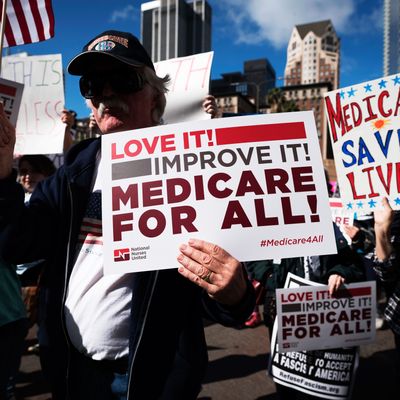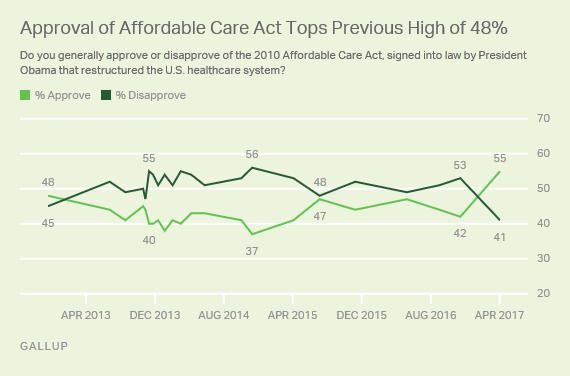
The Affordable Care Act (a.k.a. Obamacare) has done a lot of material good. Through the expansion of Medicaid and the provision of federal subsidies, the law provided access to basic medical care to 20 million Americans who’d previously gone without it. Through its various cost reforms, it brought medical inflation lower than it had been in decades.
But Obamacare also remained resolutely unpopular throughout its author’s tenure in the Oval Office, and did few favors to its Democratic boosters down-ballot. This led many liberals to see the law as a policy success and a political failure. Which is clearly true, from one angle.
But recent weeks have provided fodder for a contrarian take. Without question, the ACA has made great progress on its core objectives. But the law’s signature marketplaces did not replace much of the nation’s employer-based insurance system, as health economists once hoped. And the individual mandate has proven far too lenient to induce young, healthy people onto the rolls. Combined with the GOP’s various acts of sabotage, this flaw has left many of the law’s rural marketplaces devoid of competition.
What’s more, if we define the law’s ultimate policy goal as providing affordable health care to all Americans, then it has been a failure: More than 25 million people remain uninsured (a figure that’s been inflated by Republican governors’ rejection of Medicaid expansion), and many who are insured cannot afford to take full advantage of their benefits.
But in the long run, these policy defects may be overshadowed by the ACA’s great political achievement: popularizing the idea that the government should guarantee health care to its citizens as a right.
This is not a radical idea. Every other advanced democracy arrived at it long ago, and many Americans already subscribed to the notion before Obamacare was ever introduced.
But as the Trumpcare debate illustrated, the ACA grew the constituency for government-provided health care while fostering the American public’s sense of entitlement to affordable insurance.
The GOP anticipated this development, which is why it fought so hard, on so many fronts, to kill the law. When those efforts failed, for short-term political gain, many Republicans chose not to attack Obamacare’s core premise — that the government should facilitate universal access to basic health care — but rather to attack the law for failing to realize that left-wing ideal.
“What you need to understand is that there are 25 million Americans who aren’t covered now,” Mitch McConnell told Face the Nation back in January. “And many Americans who actually did get insurance when they did not have it before have really bad insurance that they have to pay for, and the deductibles are so high that it’s really not worth much to them.”
Republicans notched some electoral wins by pairing this argument with other attack lines that painted Obamacare as an act of austerity (see: death panels, keep the government’s hands off my Medicare). But the long-term effect of these attacks was to shift the terms of America’s health-care debate dramatically leftward. Once the GOP got itself back in power, and substituted its actual policy agenda for its cynical rhetoric, it promptly discovered that said agenda was unpassable.
And once the public understood that its (current) options on health-care policy were Obamacare or throwing millions of people off Medicaid to ease the economic anxiety of millionaires, Obamacare became much more popular.

Some 17 percent of Americans approved of Donald Trump’s health-care plan. Here’s how blue America’s ideas for health-care policy currently poll:
Recently, Vox’s Sarah Kliff conducted a focus group with Obamacare enrollees who had voted for Trump. Her findings offer an anecdotal testament to those of YouGov:
We were in Harrisburg, Pennsylvania, sitting in a sparse conference room at a big white table. Perry, who co-owns the research firm PerryUndem, asked the six-member group a question: Who likes Canada’s health insurance system? Who wishes we had something like that?
Half of the hands shot up.
“There’s a lot of countries that it works very successfully in,” Michelle said of a Canadian-style single-payer system. (Focus group participants agreed to have their first names published.)
“Everybody, despite income, should be encouraged to take care of their health,” Eric added.
“I actually like socialized medicine,” Sharon, another of the focus group participants, told us.
The Republicans didn’t just lose the battle on health care — they lost the war.






























